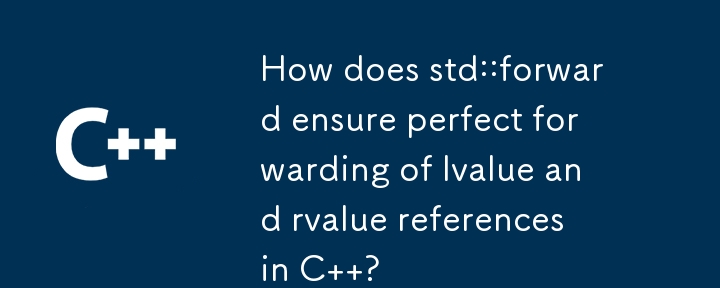

How std::forward Facilitates Perfect Forwarding of Lvalue and Rvalue References
In C , std::forward plays a crucial role in achieving perfect forwarding, which ensures that arguments are passed to functions with their original value category preserved. This behavior can be particularly confusing when dealing with lvalue and rvalue references.
Lvalue vs. Rvalue Distinction
"If it has a name, it's an lvalue." While this saying generally holds true, it doesn't fully explain the behavior of std::forward when dealing with thing&& x vs. thing& x.
Lvalue References (thing& x)
When an argument is passed by lvalue reference, it remains an lvalue reference within the function. Lvalue references are always bound to a specific, named memory location.
Rvalue References (thing&& x)
In contrast, when an argument is passed by rvalue reference, it can either be an rvalue reference or a converted lvalue reference. An rvalue reference is bound to a temporary object or a value that is being moved.
How std::forward Works
std::forward is defined by a special conversion table. Its primary purpose is to convert a reference of any type to an rvalue reference. This conversion does not change the value category of the original argument.
Example: Perfect Forwarding Using std::forward
Consider a template function perfectSet that accepts a T&& argument:
template<class T>
void perfectSet(T&& t) {
set(std::forward<T>(t));
}Now, when perfectSet is called with an lvalue, the type T in the instantiated function is inferred as T&. The std::forward conversion ensures that the argument is passed to set as an lvalue reference.
std::vector<int> v; perfectSet(v); // lvalue reference passed to set
However, if perfectSet is called with an rvalue, T is inferred as T&&, and std::forward converts the argument to an rvalue reference, enabling move semantics in set:
perfectSet(makeAndFillVector()); // rvalue reference passed to set
Conclusion
std::forward is a powerful tool that facilitates perfect forwarding by preserving the value category of arguments passed to functions. This enables efficient and type-safe transfer of values, ensuring optimal performance and code correctness.
The above is the detailed content of How does std::forward ensure perfect forwarding of lvalue and rvalue references in C ?. For more information, please follow other related articles on the PHP Chinese website!




